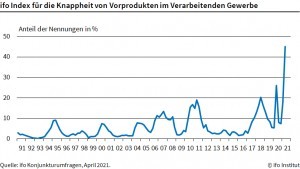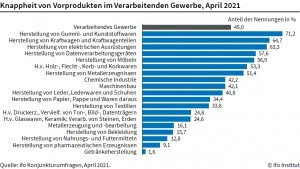Shortages of primary products have become a serious problem for German industry. 45% of the industrial companies surveyed by the ifo Institute in April reported bottlenecks. This is by far the highest figure since January 1991. In January 2021, it was only 18.1%, in October 2020 only 7.5%. "This new bottleneck could jeopardize the industry's recovery," says Klaus Wohlrabe, head of the ifo surveys.
Manufacturers of rubber and plastic goods are particularly affected by material shortages at 71.2%. This is followed by car manufacturers and their suppliers at 64.7 percent, producers of electrical equipment at 63.3 percent, computer manufacturers at 57.6 percent, furniture manufacturers at 56.9 percent and manufacturers of wood, wicker and basketry products at 53.3 percent.
In contrast, some sectors were barely affected by the problem: 9.1 percent of pharmaceutical companies felt a shortage of materials and only 1.6 percent of beverage manufacturers, according to ifo.
The ifo Institute asks the question about preliminary products every three months. At the end of March, the container ship Ever Given blocked the Suez Canal for days, blocking imports from Asia, because it had strayed into the shipping lane. In addition, computer chips and wood, for example, are currently in short supply.




